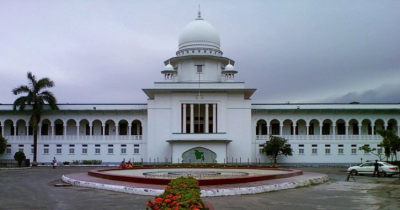The journey from Char to Gaibandha city for medical help can take up to 4 hours, leaving many without lifesaving care in time. Photo: Messenger
Approximately 450,000 people inhabit the 165 chars of Gaibandha, grappling with a dire lack of access to emergency medical services.
Situated amidst the winding rivers of Teesta, Brahmaputra, and Jamuna, these islands endure isolation and deprivation, leading to tragic consequences for many.
Due to its isolated location, the journey from Char to the mainland or the city takes three to four hours, resulting in devastating consequences. Tragically, many individuals, particularly pregnant women, children, and the elderly, are succumbing to health complications without receiving timely medical attention.
The district of Gaibandha, situated amid the Teesta, Brahmaputra, and Jamuna rivers, harbors 165 permanent and over 100 temporary pastures where the population resides. Despite their hardships, the plight of those living in the Char area remains largely unnoticed, as their geographic seclusion impedes the delivery of vital civic amenities.
Two years ago, a harrowing incident in Durgam Kalur pasture shed light on the critical deficiencies in healthcare services within the pasture area. The story of Katar Helena Begum, who tragically lost her life due to lack of access to timely medical care, epitomizes the challenges faced by the community.
Reports from the District Statistics Office reveal that approximately 231,000 people inhabit the Char area, yet local upazila parishad chairmen estimate the actual figure to be 450,000. Midwives and residents from various pastures, including Kalurpara and Gupta Moni Char, lament the absence of health workers and the insurmountable distance to medical facilities, leading to perilous home births and limited access to critical healthcare.
The implications of this crisis are profound, with high rates of early marriage and childbirth contributing to increased maternal mortality. Shockingly, the Char area is plagued by a severe shortage of healthcare providers, with vacant positions and inadequate infrastructure exacerbating the predicament.
The absence of Family Welfare Visitors (FWVs) and Community Health Care Providers (CHCPs) further compounds the challenges faced by the community.
Moreover, the healthcare facilities in the region are marred by insufficient medication, medical equipment, and irregular visits by medical personnel, significantly undermining the provision of essential healthcare services. The predicament is particularly acute for women, who encounter obstacles in seeking medical assistance, with male healthcare workers inadequately equipped to address their nuanced healthcare needs.
Residents of Kunder Para Char, known as the "capital of Char," endure similar hardships, as the arduous journey across the river compounds their struggle to access healthcare. The situation is further exacerbated by the unavailability of doctors at local clinics, exacerbating the healthcare crisis.
As residents continue to grapple with the consequences of inadequate healthcare access, urgent action is warranted to address this pressing issue. Without concerted efforts to bridge the gap in healthcare services, the residents of Gaibandha's chars will continue to suffer in silence, their voices drowned amidst the flowing rivers that define their existence.
The plight of Gaibandha's chars underscores the urgent need for comprehensive healthcare reforms to ensure equitable access to medical services for all residents. As policymakers grapple with the challenges posed by remote island communities, the lives and well-being of countless individuals hang in the balance, awaiting tangible solutions to alleviate their suffering.
Messenger/Fameema








